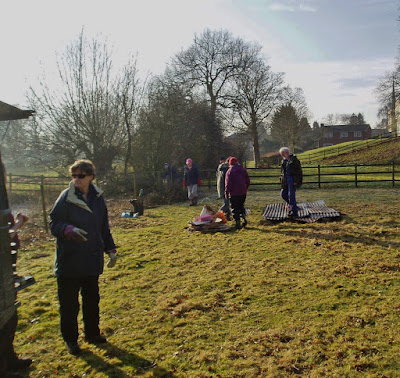By the Session Leader:
A beautiful
site, a good turn-out, slight fog, and frozen ground; but a promise that sunny
weather was on its way.
Two tasks:
burning brash; and replacing a rotten gate-post.
Two
problems: the brash might be too wet to burn; and the ground might be frozen
too hard to dig out the old post, and dig in the new.
So we split
into two teams.
The first
job on the old post was to pry off the cross bar supports and unbolt the gate
catches, well rusted in with five big coach bolts. [Bolts
fitted by Wallingford Green Gym, as we sunk the original posts, and hung the
gate, as part of the pond-area restoration project, which was the first major
undertaking for WGG, all those years ago. – Ed.]
With the right spanner and a strong arm, the
fittings came away, and were put aside for the new post.
The old post
was now free, and easy to lift out. Then
came the long task of digging out the rotten wood below the ground, and slotting
in the new post. A task so arduous that
the photographer was carried away with enthusiasm, and forgot to take pictures
of the work until it was all finished at the end of the session (bar fixing the
metal fittings):
[Thus you will simply have to take our word
for it that the excavating team was a mixed male-female group. – Ed.]
The incendiary
team started by building a platform for their fire, to prevent damage to such “an
important archaeological site”:
A pile of
brash was already there and ready, except that it was the wrong side of a
barbed wire fence.
The fire
raising experts coaxed a fire into life:
To
help our controlled bonfire along, some drier cut-stuff was brought across from
where the bush surrounding the area of the pond (frozen this morning, of
course) had been given a ‘haircut’. The
trimming of the hedge had also opened up more of a view:
When a few
larger logs had been added to the nascent bonfire, it was time to take a break, while the wood on the fire dried out, and started to give the blaze
some more heat.
Over
tea-break we reflected that there were a dozen of us in the work-party, which
felt very satisfying. “Twelve is a good
number of people to have,” observed one volunteer. “An apostolic number,” commented another, who
had hastily to explain that it was the number of Jesus’ closest ‘disciples’
(students), and added they were sure there were good practical reasons for
picking twelve to mess together (therefore necessarily all the same sex/gender,
so as not to offend the sensibilities of the time/culture), learn together, and
then go out on mission as ‘apostles’ (ambassadors) – as well as the symbolism
of the number matching the number of the tribes of Israel.
Which in
turn prompted a discussion of who could name all the tribes of Israel. None of us could! So the Editor was enjoined to look out a
definitive answer. This from the Virtual Jewish Library:
Biblical tradition holds that the twelve tribes of Israel are descended from the sons and grandsons of the Jewish forefather Jacob and are called ‘Israel’ from Jacob’s name given to him by God. The twelve tribes are as follows: Reuben, Simeon, Judah, Issachar, Zebulun, Benjamin, Dan, Naphtali, Gad, Asher, Ephraim and Manasseh.
Thoughts
then turned to the observation that in the painting of the Last Supper by Leonardo, there are apparently more limbs than could
belong to those depicted as being present at the scene. – A highly cultured
conversation, ended abruptly when we realised there were only eleven of us
present at tea-break. Had we lost a
Green-Gymmer somewhere along the way, or were there only ever 11 of us
today? A hasty re-count of the
attendance list yielded a total of 11 members signed up for the session.
It was after
the tea-break that the fire really got going:
More cut
vegetation was on the opposite side of the site. Some of the strongest members [again, by no means an all-male squad - Ed.] piled it all on
tarpaulins, and by brute strength dragged it all the way over to the fire:
This new fuel was rather wet. Hence the
smoke screen, hiding everyone from view:
At
going-home time for us volunteers, we left one of the wardens behind to wait
until the fire had burned out and was safe to leave. A very pleasant day was had by all.














No comments:
Post a Comment